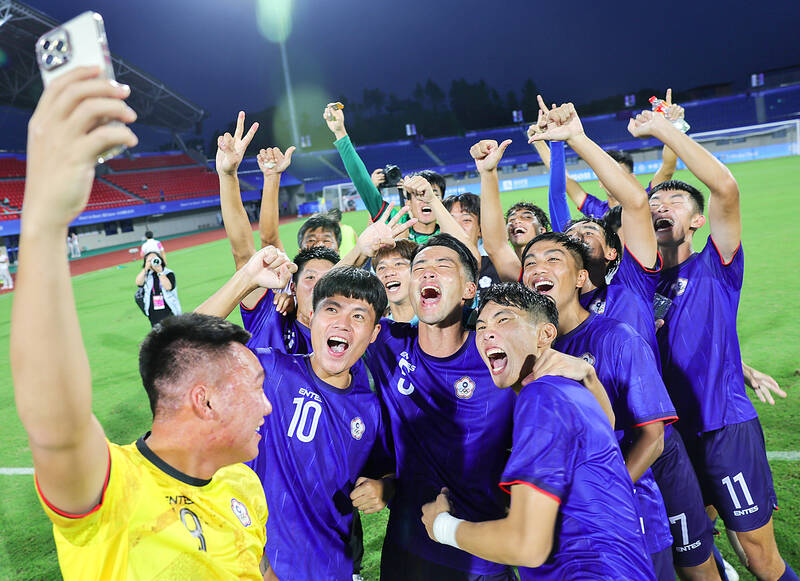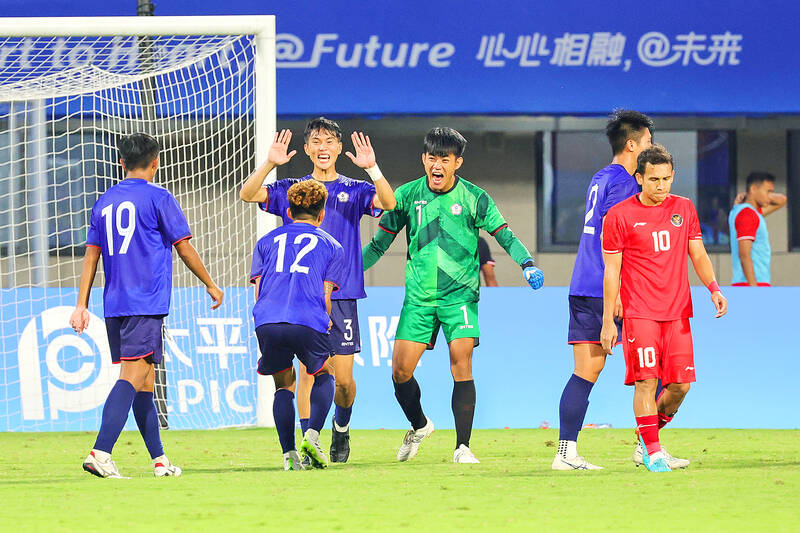China hopes to make a splash with the Asian Games, which officially open tomorrow, but nationwide excitement has been muted as the economy sputters and some question the cost of the sporting extravaganza.
Delayed a year by the COVID-19 pandemic, the quadrennial Games, kicking off in the eastern city of Hangzhou, will be China’s biggest sporting event in more than a decade, with more than 12,000 athletes from 45 nations competing in 40 sports.
Organizers this week expressed confidence in holding a “magnificent” Games, thanks to Chinese President Xi Jinping’s “important instructions” and great, broad-based efforts. Analysts agree the event would likely go smoothly, given China’s famously meticulous preparations.

Photo: CNA
Local officials would be aware that Xi previously worked in Hangzhou, is known to like big sporting events and is to host a long list of leaders and other VIPs — including Syrian President Bashar al-Assad on only the second visit by a Syrian leader to China since the nations established diplomatic ties in 1956 — but enthusiasm in Hangzhou and elsewhere in China is lacking, with some saying the new stadiums and other gleaming facilities reflect misplaced priorities.
“After three years of COVID, the economic and social atmosphere in China and the confidence are really low, and for Hangzhou these Asian Games are just a cash-burning project,” said John Yan, founder of the Chinese media firm Score Sports and a leading soccer commentator in China.
“People care more about their own lives and the Asian Games are not on the top of their list of concerns,” Yan said. “People just don’t care.”

Photo: CNA
Organizers have not disclosed spending for the Games, though the Hangzhou government has said it spent more than 200 billion yuan (US$27 billion) in the five years through 2020 on transport infrastructure, stadiums, accommodation and other facilities.
“It would be better if this money were spent on the common people and on the youngsters,” said Jiang, 69, a Hangzhou resident who asked to be identified only by her surname. “It’s hard to find a job now. Some companies have closed down. It’s really not easy for young people nowadays.”
The expected flow of Chinese medals could lift the public mood around the Games. Various issues marred the buildups to Beijing Olympics in 2008 and last year, but “when the sporting action kicks off, then the narrative very much changes,” said Beijing-based commentator Mark Dreyer, author of a book on China’s sporting ambitions.
Still, in an indication of the subdued tone for the Asian Games, state media coverage until this week has been less comprehensive than before last year’s Olympics — which were much smaller than these Games and held under strict COVID-19 restrictions.
It is easy to be unaware of the Games, some Chinese social media users have written, unless you visit Hangzhou, where the slogans and other promotion are overwhelming.
The city in the wealthy province of Zhejiang near China’s financial capital, Shanghai, known for its picturesque lake, greenery and tea plantations, has been transformed in a huge spruce-up akin to Beijing’s before the 2008 Olympics.
Hangzhou’s streets wear bright colors to match Games posters, pensioners have received English lessons and officials have adorned some older-looking or road-facing properties with flowers or other decorations.
“The impression I have is that over the past year, the entire city has been under construction,” said 42-year-old city-center resident Wu Lili, an e-commerce business owner. “There’s a saying online: ‘The Hangzhou city government, when encountering even a dog, wishes they could catch it and give it a fresh coat of paint.’”
Several residents said they were happy with the improved transport links and hoped for a boost to the local economy. Some saw the Games as a welcome sign of opening up to the world amid concerns Xi’s China was taking an inward, national security-focused shift.
“Over the past few years due to the pandemic, our entertainment activities and mental well-being have been suppressed for a long time, so we need such events to boost our confidence,” said a 24-year-old auto sector worker who asked to be identified only as Zhang.
Jules Boycoff, an academic who studies the politics of sport at Pacific University in Oregon, said that for China’s authorities, “it’s about registering power at home, but it’s also about putting your best foot forward to a global audience at a time when there’s a lot of skepticism in the West toward China.”
Taiwan yesterday bounced back from their 2-0 defeat to North Korea on Tuesday to defeat Indonesia 1-0 in Group F of the men’s soccer tournament.
Chin Wen-yen scored two minutes after halftime and the team held on for their first Asian Games victory in 65 years.
In the first round of the women’s soccer tournament later yesterday, Taiwan came from behind to beat India 2-1 in Group B.
In Pool D of the preliminary round of the men’s volleyball, Taiwan defeated Mongolia 25-22, 25-20, 25-21.
Additonal reporting by staff writer

Bologna on Thursday advanced past Empoli to reach their first Coppa Italia final in more than half a century. Thijs Dallinga’s 87th-minute header earned Bologna a 2-1 win and his side advanced 5-1 on aggregate. Giovanni Fabbian opened the scoring for Bologna with a header seven minutes in. Then Viktor Kovalenko equalized for Empoli in the 30th minute by turning in a rebound to finish off a counterattack. Bologna won the first leg 3-0. In the May 14 final in Rome, Bologna are to face AC Milan, who eliminated city rivals Inter 4-1 on aggregate following a 3-0 win on Wednesday. Bologna last reached the

If the Wild finally break through and win their first playoff series in a decade, Minnesota’s top line likely will be the reason. They were all over the Golden Knights through the first two games of their NHL Western Conference quarter-finals series, which was 1-1 going back to Minnesota for Game 3 today. The Wild tied the series with a 5-2 win on Tuesday. Matt Boldy had three goals and an assist in the first two games, while Kirill Kaprizov produced two goals and three assists. Joel Eriksson Ek, who centers the line, has yet to get on the scoresheet. “I think the biggest

From a commemorative jersey to a stadium in his name, Argentine soccer organizers are planning a slew of tributes to their late “Captain” Pope Francis, eulogized as the ultimate team player. Tributes to the Argentine pontiff, a lifelong lover of the game, who died on Monday at the age of 88, have been peppered with soccer metaphors in his homeland. “Francisco. What a player,” the Argentine Football Federation (AFA) said, describing the first pope from Latin America and the southern hemisphere as a generational talent who “never hogged the ball” and who showed the world “the importance of having an Argentine captain,

Noelvi Marte on Sunday had seven RBIs and hit his first career grand slam with a drive off infielder Jorge Mateo, while Austin Wynn had a career-high six RBIs as the Cincinnati Reds scored their most runs in 26 years in a 24-2 rout of the Baltimore Orioles. Marte finished with five hits, including his eighth-inning homer off Mateo. Wynn hit a three-run homer in the ninth off catcher Gary Sanchez. Cincinnati scored its most runs since a 24-12 win against the Colorado Rockies on May 19, 1999, and finished with 25 hits. Baltimore allowed its most runs since a 30-3 loss to